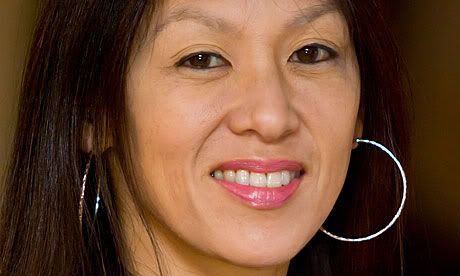 |
Nobody is writing about this, so my modest blog may as well tackle the taboo topics.
I've recently been repeatedly struck by aggressive Chinese behavior - whether it is subtly carried out like the narrowing in on white males by Chinese women (immigrant or ethnic), by cracks in Chinese mothering techniques by Chinese living in the West (I'm not interested in what Chinese do behind their own borders), and of course the Chinese going where they've never been before, siphoning off water from poor countries, for example, to alleviate their own disastrous policies. I won't even grace Obama's latest bow to Hu Jintao, in Washington, no less.
One of the effects of this wonderful cultural intrusion is that we get all the pagan and heathen superstitions that used to come in (Chinese) factory manufactured strips found in "fortune" cookies now spoken to us in their fuller versions by Chinese sages.
The Chinese don't like death, they don't like funeral parlors, and certainly not hospices. Residents of a Vancouver building are loudly protesting plans to build a hospice near their "million dollar" high rise apartments. They're appealing to (their) cultural taboos to abort this plan.
Here are some quotes from The Province (a British Columbia publication):
- "We cannot have dying people in our backyard," said rally organizer Janet Fan, Wednesday "It’s a cultural taboo to us and we cannot be close to so many dying people. It’s like you open your door and step into a graveyard."
- One resident says: "We believe that people dying outside will bring us bad luck," she added. "I’m very angry and upset. If I had known it was going to be a hospice, I wouldn’t buy it for half the price."
- Another, clutching her toddler son adds: "It’s very disturbing,”"she said. "My kids and I are going to feel so frightened and angry just to think there are dying people so close to us."
- And the this, in a letter addressed to the University Neighborhood Association:
"'Death is the Yin and 'Live' is the Yang,” it read. "If the Yin and Yang are near to each other, 'Death' will bring bad luck, meaning sickness and even death . . . The ghosts of the dead will invade and harass the living."
- The letter said Asians believe that living next to "death" would "lead to failure of business, the loss of money, the break of marriage and family, and the healthy growing up of children will be affected."
The paper compares this "opposition" to the building with other protesters. Namely, a group of students from University of British Columbia who didn't want to tone down their rowdy drunken parties.
Joe Stott, director of Campus and Community Planning, says: "[T]here’s no evidence that a hospice reduces property values.”
This could be a funny Saturday Night Live skit. But it's not that humorous. In the West, dignity is given even at death. Hospices are a dignified way for families to come to terms with a dying relative, and to have him spend the last days of his life in as much comfort (and dignity) as possible. I keep using the work "dignity" but it is not for lack of other words. I've written about the usurpation dignity that Chinese seem to practice. Of course critics will say that I don't have enough evidence, but we do get Chinese women writing quite explicitly about their lives, most recently Amy Chua's memoir, and in the various semi-autobiographical books that Amy Tan has written, showing has the ways that Chinese mothers humiliate their children (daughters, mostly, it seems).
So, I am not surprised that base desires and superstitious beliefs induce these Chinese (notice how all those interviewed, or at least providing their opinion, are women) Vancouver residents to act out inhumanely (this is what I wrote about Chua's treatment of her daughters) towards the dying.
Like the American Renaissance article titles this piece: Another crack in Canada’s multicultural edifice.